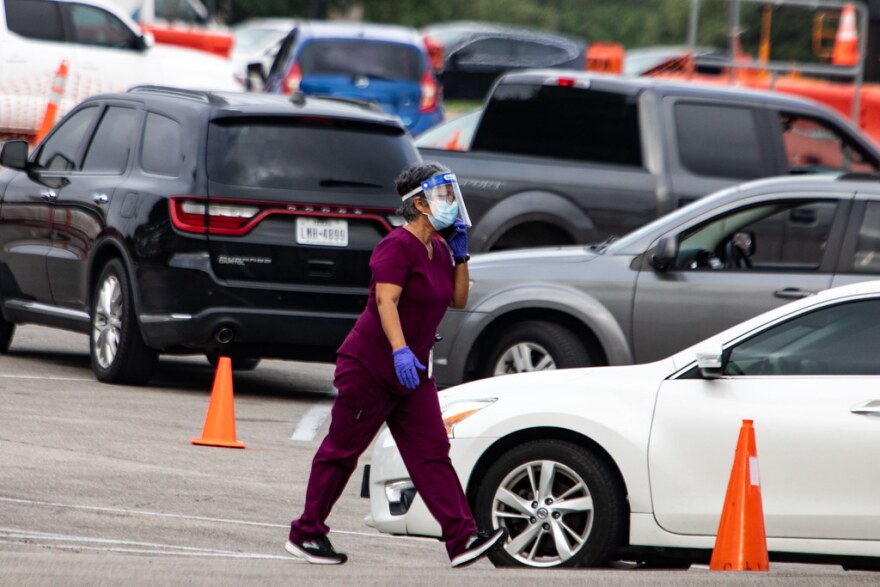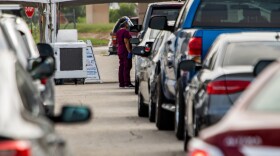What questions do you have about health care disparities during the coronavirus pandemic? Dr. Jewel Mullen joined us for a live conversation Wednesday afternoon to answer those questions.
Mullen, associate dean for health equity at Dell Medical School and an associate professor in the school’s population health and internal medicine departments, spoke with KUT's Ashley Lopez.
Watch the video below:
Each week on Now What?, KUT reporters talk with leading scientists, researchers and thinkers from across Dell Medical School and the University of Texas at Austin about what we need to know about COVID-19 moving forward.
Interview Highlights
Note: This transcript has been edited lightly for clarity. To hear to the full interview, watch the video above.
KUT: Let's start by talking about how the pandemic is affecting communities and what specific communities in Austin. Is there anything about Austin that is unique compared to what we're seeing elsewhere around the country?
Dr. Jewel Mullen: I'm going to start with the unique part, and thank you for asking me that question, because I think a lot of us in Austin like to see ourselves as unique. What I found really striking over the past several months is how we stayed in what I called a "prolonged grace period." We saw horrible circumstances in the Northeast, for example, and the emergence of other outbreaks in places like Detroit, in other parts of the South and other parts of Texas.
In Austin, I think people felt like we were never going to have the crisis that we have right now. So the only thing that made us unique, I would say, is that our grace period lasted for a long time, and maybe because of that, we're having an even harder time grappling with some of the realities of what we really need to do to protect ourselves and those around us.
Unfortunately, we're not unique in the way in which we're seeing health disparities play out, the unevenness and the inequity in the way in which COVID-19 is affecting different communities. I want to start, before I get into anything specific about that, by saying I acknowledge that even as I talk about what concerns so many people — the disproportionate impact of COVID on the Latinx community in Austin and in the U.S., the disproportionate impact of COVID on African-American communities in places like Texas and other parts of the U.S. and then in Native American communities — we do that without having as much data as we need. So keep this in mind.
What I read this morning is that if we compare states, looking at Texas right now, we're said to only be reporting data on cases of COVID by race in less than 10% of the people who are affected, so for everything that we think we know, there's still a lot that we don't know.
Still, Austin Public Health has been reporting for us for a while now that anywhere from 50 to 60 to a little over 60% of the cases, six out of 10 that we know about in Travis County, have been identified among people who are Latinx. We also get data that tell us the cases among African-Americans are similar to the percentage of African-Americans in the Austin population. But once again, there are a lot of data that we do not have.
And we've spent a lot of time saying we need to protect older people. Well, maybe we've done that to the extent that we gave younger people too much false reassurance about their own risks, no matter what race or ethnicity they are. And sometimes I get worried that that message about 60% Latinx impact of cases, has made some white people think they're not at risk. And that concerns me as a public health person, too, because we're all in this together and the risks that we take can translate into risks for other people around us. That's a long answer. But I wanted to get it out there.
KUT: Is it safe to say that there is a socioeconomic and racial divide between who has the ability to work from home? And work from home jobs are, you know, for the most part white collar jobs. This one divide between how people work in their lives is now more stark in terms of who has access to those jobs that you can easily work from home.
Mullen: You just said something that's really important. Every time we rightfully talk about our concerns about the disproportionate impact of COVID among racial and ethnic groups, if we don't layer in the connection between race, ethnicity and socioeconomic factors, specifically social inequality, then we're not having the full conversation. So you've said that, that's absolutely true. Fewer than one in five, fewer than 20%, of Latinx individuals can work from home. That's very fundamentally going to make it a lot harder for people, much harder.
KUT: I want to also pivot to what we don't know about why this is happening. Our lack of data, or just the fact that we're so early in this. What are the questions you have in your mind that you still don't think there are a lot of answers to?
Mullen: I ask myself, for starts, how to make sure we get the message across that when we talk about the Latinx community, we remind people that we're talking about a very diverse group of people. We can't do the "if you've seen one person, you've seen the whole community or the whole group." And so, as we have more data, we need to have more understanding not just about how people work, but how they live, what else they do. Because if we go too quickly to the things that are right in our face, then we also miss out on the opportunities to address some other things that we might not know about, about people's conditions.
We need to have more information not just on who's testing positive. We need to know more information about who's trying to get tested and can't even get a test.
You know, we have been seeing Austin Public Health and others try to get access to more tests out there. We need to know more about the people that we always talk about as being undercounted because they're not as emergent publicly, because they're trying to stay safe, because they're trying not to be deported, because they're concerned about whether or not someone will think they're a burden on a social service system. We don't know.
We need to know more about whether or not the way in which we communicate with our Latinx communities is really efficient and effective for that. You know, we can talk jargon, we can talk advice, but we need to know whether or not the messages that we're trying to impart really work well for people.
We need to know more about people's mental health, their emotional health and their social well-being. Understandably, we think a lot about who's getting physically ill. But health is not just about the physical illness. It's about mental illness and well-being. It's about one's social well-being. Have we further characterized how many people are hungry now? How many people are on the verge of being evicted from their homes? Those are also very important data elements that we need so that our social services can be supportive for people as well.
If you found the reporting above valuable, please consider making a donation to support it. Your gift pays for everything you find on KUT.org. Thanks for donating today.





